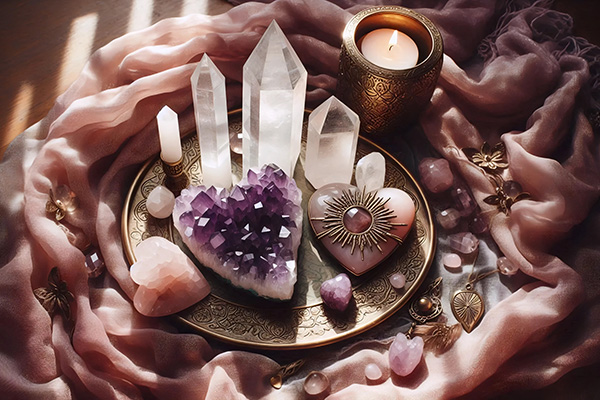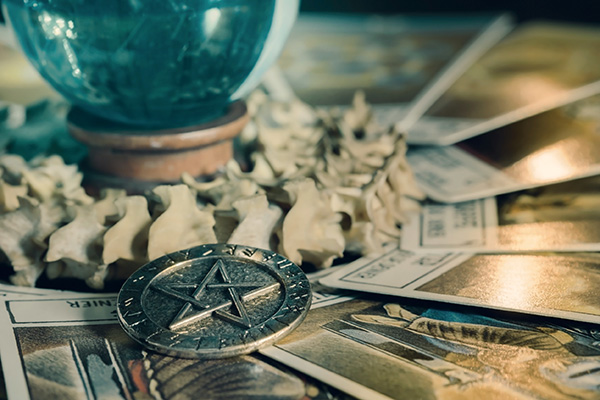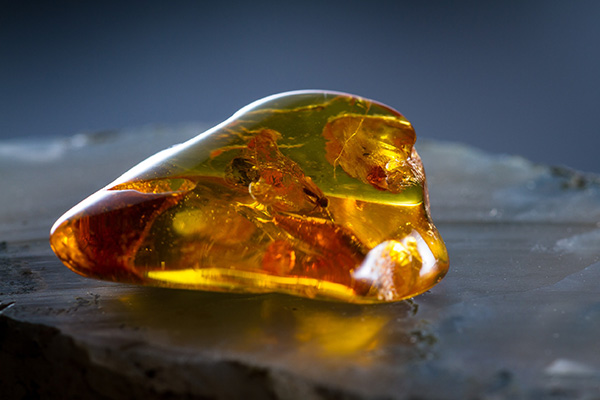charms
Crystals Can Revive Your Spiritual Brilliance!
 Life these days can be very demanding and it is often a challenge to successfully balance all aspects of mind, body and soul.
Life these days can be very demanding and it is often a challenge to successfully balance all aspects of mind, body and soul.
Busy work days, financial responsibilities, and the demands of our social and family life, can make it so easy to allow our spiritual practice to slip.
Fortunately, the metaphysical power of crystals can help us keep our spiritual motivation going. Here’s how.
Ask For Support
Should you feel the need for support from a particular crystal, then all you need to do is simply ask for it.
For example, do you think you need to increase your self-discipline, or that your resolve should be strengthened?
If so, gently hold some malachite in one hand and request that it helps and supports you to this end. In fact, you could carry it with you at all times whenever you sense the need of its help.
Meditate With A Crystal
Before getting up in the morning, lie quietly for ten minutes with your amethyst positioned on the third eye – that being the middle of your forehead. While breathing deeply, visualize the energy this purple stone contains permeating every cell in your body and thus spiritually motivating and invigorating you.
Transform Your Love Life With Color Magic
 Color magic is a powerful and accessible form of energy work to improve relationships and align your romantic life with your deepest intentions.
Color magic is a powerful and accessible form of energy work to improve relationships and align your romantic life with your deepest intentions.
While it is often associated with color therapy, a practice that uses the vibrational frequencies of different colors for healing, color magic takes it a step further. It allows you to manifest your wishes and desires with intentional purpose, vibrational alignment, and energetic attraction.
When it comes to love and relationships, color energy work can be your intuitive ally. Whether you’re longing to meet your soulmate, hoping to reignite the spark in a long-term relationship, or seeking emotional healing after a breakup, the energies of color can empower you.
Each hue carries its own vibration, acting like an energetic tuning fork that aligns your internal frequency with your heart’s desires.
Color surrounds us everywhere: in the clothes we wear, the food we eat, and the spaces we inhabit. With increased awareness, we can begin to use color intentionally to attract, heal, and transform our romantic lives.
Infuse your daily life with color vibrations that powerfully align with your desires: rose quartz pink for unconditional love, emerald green for heart healing, and lush purple for passion and depth. These choices go beyond fashion or aesthetics — they are acts of conscious, deliberate creation.
Color magic is a subtle yet potent tool in your metaphysical toolkit. It bridges the physical and energetic realms, enabling you to co-create with the universe in a beautiful, spiritually empowering ways. Ultimately, love is energy. So is color. When you bring them together mindfully and with an open heart, you become a magnet for connection, transformation, and the deep, soul-level love you’ve been yearning for.
A Samhain Invitation From The Faeries
 Fairies love fun and joyful games in the great outdoors, even during the darker seasons of the year. I am reminded of this every year at this time when the veil between the worlds thins during the mystical season of Samhain and Halloween.
Fairies love fun and joyful games in the great outdoors, even during the darker seasons of the year. I am reminded of this every year at this time when the veil between the worlds thins during the mystical season of Samhain and Halloween.
If you’re currently experiencing a highly creative period or feeling called to get out into nature, even if it’s just to your garden before the weather gets too cold, there’s a good chance you’re also being invited to have some fun and free-spirited playtime with the fairies.
It is easiest for us to connect with the Faeries or Fae during the times of the year when the seasonal energy portals are open at the cross-quarter holidays of the Summer and Winter Solstices and the Spring and Fall Equinoxes.
These seasonal transitions are also traditionally celebrated in the ancient pagan festivals and religious holy days of Imbolc (St. Brigid’s Day) on February 1st, Ostara (Easter) on around March 21st, Beltane (St. Walburga’s Day) on May 1st, Litha (St. John’s Day) around June 20th or 21st, Lammas (Day of Bread) on August 1st, and Samhain (All Saints’ Day) on October 31st.
Traditionally celebrated as a time to honor our ancestors and reflect on the cycle of life and death, Samhain on October 31st marks the halfway point between the Autumnal Equinox and the Winter Solstice. It is a special time that invites us to step beyond the ordinary into the realm of magic and mysticism. The lingering echoes of autumn and the approaching winter in the Northern Hemisphere also foster a sense of introspection and connection to nature, making it an optimal time to commune with the ethereal elementals of nature.
How To Deal With Toxic Drama Royalty
 These days, there is drama, crazy-making and toxic behavior everywhere you turn. And it’s not just on social media and public transportation…many of us have to deal with people in our personal and professional lives who are overly demanding, entitled, melodramatic, mean-spirited, always in victim mode, or just plain unhinged.
These days, there is drama, crazy-making and toxic behavior everywhere you turn. And it’s not just on social media and public transportation…many of us have to deal with people in our personal and professional lives who are overly demanding, entitled, melodramatic, mean-spirited, always in victim mode, or just plain unhinged.
Sadly, many of these spiritually handicapped souls are people close to us, people we care deeply about. It can be daunting to deal with their toxic actions and volatile behaviors, and trying to ignore them is exhausting and even impossible in the long run.
But other people’s dysfunction and drama doesn’t have to weigh down your spirit, and it doesn’t always have to be so difficult to deal with, especially with some spiritual support and backup.
The first rule to remember is that love works better than anything else. So, the first step should also be to offer the “drama royal” plenty of compassion.
Chances are the drama king or queen in your life is wounded in some way. Dysfunctional behavior and toxicity often stem from unresolved hurt or deep trauma.
Many people who exhibit dramatic or demanding tendencies often aren’t aware of how their behavior affects others. They may be caught in a cycle of emotional turmoil and, as a result, seek external validation through attention and theatricality. Rather than focusing on the label “drama,” it’s helpful to think of these behaviors as expressions of unresolved pain or unmet emotional or spiritual needs.
How To Deal With Spirit Presence In Your Home
 Spirit energies are around us all the time in all shapes and forms. Many people have experienced, or at least know someone who has, a spirit presence or paranormal activity in their home.
Spirit energies are around us all the time in all shapes and forms. Many people have experienced, or at least know someone who has, a spirit presence or paranormal activity in their home.
These encounters can range from subtle to intense, and the nature of the experience often varies greatly depending on the person’s beliefs, fears, and openness to the supernatural.
For some, the presence of a spirit is a source of terror, while for others it is a comfort, like being in the presence of an old friend. Then there are those who scoff and laugh at the very idea that a ghost could exist.
These varied responses highlight an important question: why do people have such different experiences with spirits?
In my experience, it depends on two main factors: a person’s beliefs and attitudes about spirituality and the supernatural, and the nature of the spirit presence itself, whether it is benevolent or malevolent.
My grandmother came to me within three days of her death to tell me she was okay. She gave me a sense of peace and I didn’t see her again. Years later, my mother also came to me to tell me that she was okay and that all was well where she was. It was also a one-time visit.
But with my stepson, who committed suicide, and my father, it was different. He started showing up at his former house (he had left a wife and two beautiful boys) on a regular basis. He would turn on the lights or the faucet. In the middle of the night she would hear our grandchildren talking and giggling in one of their rooms. They were only two and three years old when he died. She went to investigate, thinking they were up to no good, but only one of them was in the room. When she asked who he was talking to, her boy said, “Daddy was here.”
The True Spiritual Meaning Of The Pentagram
 Perhaps no other spiritual or religious icon is as misunderstood as the pentagram, or pentacle. The true symbolism of the pentagram, a five-pointed star often surrounded by a circle, is commonly misrepresented.
Perhaps no other spiritual or religious icon is as misunderstood as the pentagram, or pentacle. The true symbolism of the pentagram, a five-pointed star often surrounded by a circle, is commonly misrepresented.
Contrary to popular misconceptions that associate it with darkness, evil, or Satanism, the pentagram has multiple meanings within various spiritual and religious traditions, most notably within Paganism and modern Wicca.
The pentagram has been a spiritual symbol of significance for millennia, long before its association with modern religious movements.
Historically, it has been used by cultures around the world, often to represent celestial bodies, principles of harmony, or mystical concepts. Its use first appeared in ancient Greece and Mesopotamia around the 1st millennium BC.
It is not widely known that there are significant historical connections between the pentagram and Christianity. Prior to the widespread use of the cross, the pentagram was a popular symbol to adorn the jewelry and amulets of early Christians, often alongside an “X” or a phoenix. This symbol was associated with the five wounds of Christ and also represented the concept of Alpha and Omega united, as the star could be drawn in one continuous movement of the pen.
In contemporary contexts, particularly within Wicca and related neo-pagan belief systems, the pentacle has positive connotations. It’s seen as a symbol of protection, spirituality, and the interconnectedness of the elements. Each point of the star represents an aspect of balance, holistic existence, conscious living, and the cyclical nature of life.
The Mystical Properties Of Ancient Amber
 Crystals, gemstones, and incense have been widely used in spiritual, esoteric, and healing practices throughout the ages and continue to be popular today.
Crystals, gemstones, and incense have been widely used in spiritual, esoteric, and healing practices throughout the ages and continue to be popular today.
But there is another type of natural material that does not enjoy the same level of widespread recognition and popularity, despite its unique metaphysical properties and significance in various cultures and mystical traditions.
Resins are less well known and used by modern practitioners. I find that many people are unfamiliar with the various types of resins available and their metaphysical properties.
Compared to crystals, gemstones, and incense, which have gained widespread popularity in recent years, especially through social media and the Internet, resins have received less attention and exposure.
As a result, people may be less likely to encounter resins in their exploration of metaphysical tools and practices.
I also find that people who are at least somewhat familiar with resins tend to associate them with their use as incense. Resins such as frankincense, myrrh, copal, and others are often burned as incense to purify spaces, objects, and individuals. The smoke cleanses negative energies, purifies the aura, and creates a sacred atmosphere for rituals and ceremonies. Continue reading